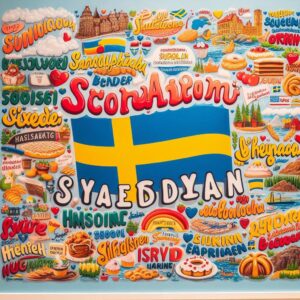Nicknames are more than just shortened forms of names. They are a reflection of intimacy, culture, and personality. In Sweden, nicknames and affectionate terms play a significant role in social interaction, from childhood to adult relationships. This article provides an exclusive deep-dive into Swedish nicknames, especially how they are used among boys, friends, and romantic partners. Whether you’re planning a trip to Sweden, learning Swedish, or simply curious about Nordic cultures, this guide is your comprehensive resource for understanding the beauty of Swedish nicknames and expressions of love.

Nicknames in Sweden
2. Nicknames in Swedish Culture
In Swedish society, nicknames are commonly used across all age groups. They are often derived from given names, personal traits, or affectionate terms. Swedish nicknames reflect the country’s relaxed, egalitarian culture. Unlike formal societies, Swedes often use first names or nicknames even in professional settings, fostering a sense of closeness and community.
Common practices in Swedish nicknaming include:
- Diminutives: adding -is or -an (e.g., Lillis from Lillian)
- Rhyming variations
- Shortened names: Alex from Alexander, Bella from Isabella
- Funny or descriptive nicknames based on personal habits or quirks
Swedes value familiarity and friendliness, and nicknames are a gentle way to express affection without overt sentimentality.
3. Nicknames in Sweden for Boys
Swedish boys often receive playful or tough-sounding nicknames from childhood. These nicknames usually persist into adulthood, especially among friends or family.
| Given Name | Common Nicknames |
|---|---|
| Alexander | Alex, Alle, Xander |
| Erik | Ecka, Rik, Eki |
| Karl | Kalle, Karlos |
| Sebastian | Sebbe, Basse |
| Johan | Jojje, Janne |
Examples:
- Sebbe: a relaxed, modern nickname for Sebastian.
- Kalle: affectionate and traditional, derived from Karl.
- Jojje: popular among friends for Johan, shows camaraderie.
Parents, siblings, and peers use these names to create a light-hearted and warm environment for growing boys.
4. Swedish Nicknames for Friends
Friendship is important in Sweden, and Swedes often use casual, humorous, or cute nicknames with their closest companions. These nicknames are typically unique to each relationship and may reference inside jokes or shared memories.
Popular nicknames among friends:
- Snutte – equivalent to “cutie”
- Tjockis – playful term meaning “chubby” (used affectionately)
- Gubben – means “old man,” used jokingly among close male friends
- Gumman – “old lady” or “dear,” a sweet and friendly term
Phrase example: “Hur mår du, Gubben?” (How are you, buddy?)
Swedes tend to bond deeply with a smaller circle of friends, making these nicknames all the more personal and meaningful.
5. Swedish Nicknames for Love
Swedish couples use a variety of affectionate nicknames in romantic relationships. These names range from sweet and tender to playful and cheeky.
Common romantic nicknames:
- Älskling – Darling or sweetheart
- Hjärtat – My heart
- Sötnos – Sweetie
- Raring – Dear or honey
- Gullis – Cutie pie
Each term expresses a different nuance of affection, often used during intimate moments or in daily conversation to reinforce emotional closeness.
Phrase example: “Jag älskar dig, älskling” (I love you, darling)
6. Cute Swedish Terms
Swedish language is full of adorable expressions that convey warmth, gentleness, and fondness. These cute terms can be used for kids, pets, or partners.
- Lilla vän – Little friend
- Pussgurka – Kiss cucumber (silly but endearing)
- Sockerbit – Sugar cube
- Gosegris – Snuggle pig (used for someone who loves cuddles)
- Mysis – From “mysa” meaning cozy; used for someone you like to snuggle with
These terms highlight the playful and affectionate side of Swedish interpersonal relationships.
7. Swedish Terms for Love
Swedes may not be the most verbally expressive people, but their language holds many touching expressions of love.
Terms for love and lovers:
- Kärlek – Love
- Förälskad – In love
- Sambos – Cohabiting partners (very common in Sweden)
- Kram – Hug
- Puss – Kiss
Phrase example: “Jag är så förälskad i dig” (I’m so in love with you)
Love in Sweden is often understated yet deeply felt, with language reflecting both simplicity and sincerity.
8. Swedish Phrases for Love
To go beyond just nicknames and explore full expressions of affection, here are some beautiful Swedish phrases used between lovers:
- “Du är mitt allt” – You are my everything
- “Jag saknar dig” – I miss you
- “Min älskade” – My beloved
- “Jag vill vara med dig för alltid” – I want to be with you forever
- “Du gör mig lycklig” – You make me happy
These phrases, although simple, are packed with emotion and are perfect for deepening your connection with a Swedish partner or just understanding the culture of love.
9. Conclusion
Nicknames in Sweden are more than cute or casual expressions—they are cultural signposts of love, friendship, and social identity. Whether you’re using them with a romantic partner, a childhood friend, or a family member, Swedish nicknames offer a beautiful way to connect.
10. FAQs
Q: Are Swedish nicknames used professionally? A: Yes, in many casual workplaces, Swedes use nicknames and first names as a cultural norm.
Q: Is it rude to use nicknames with Swedes you just met? A: It’s better to wait until the person uses a nickname or invites familiarity, especially in formal settings.
Q: Are Swedish nicknames gender-specific? A: Many are, but some like “Älskling” are gender-neutral.
Q: Do Swedes use English terms of endearment too? A: Sometimes, especially among younger couples or in multicultural relationships.






